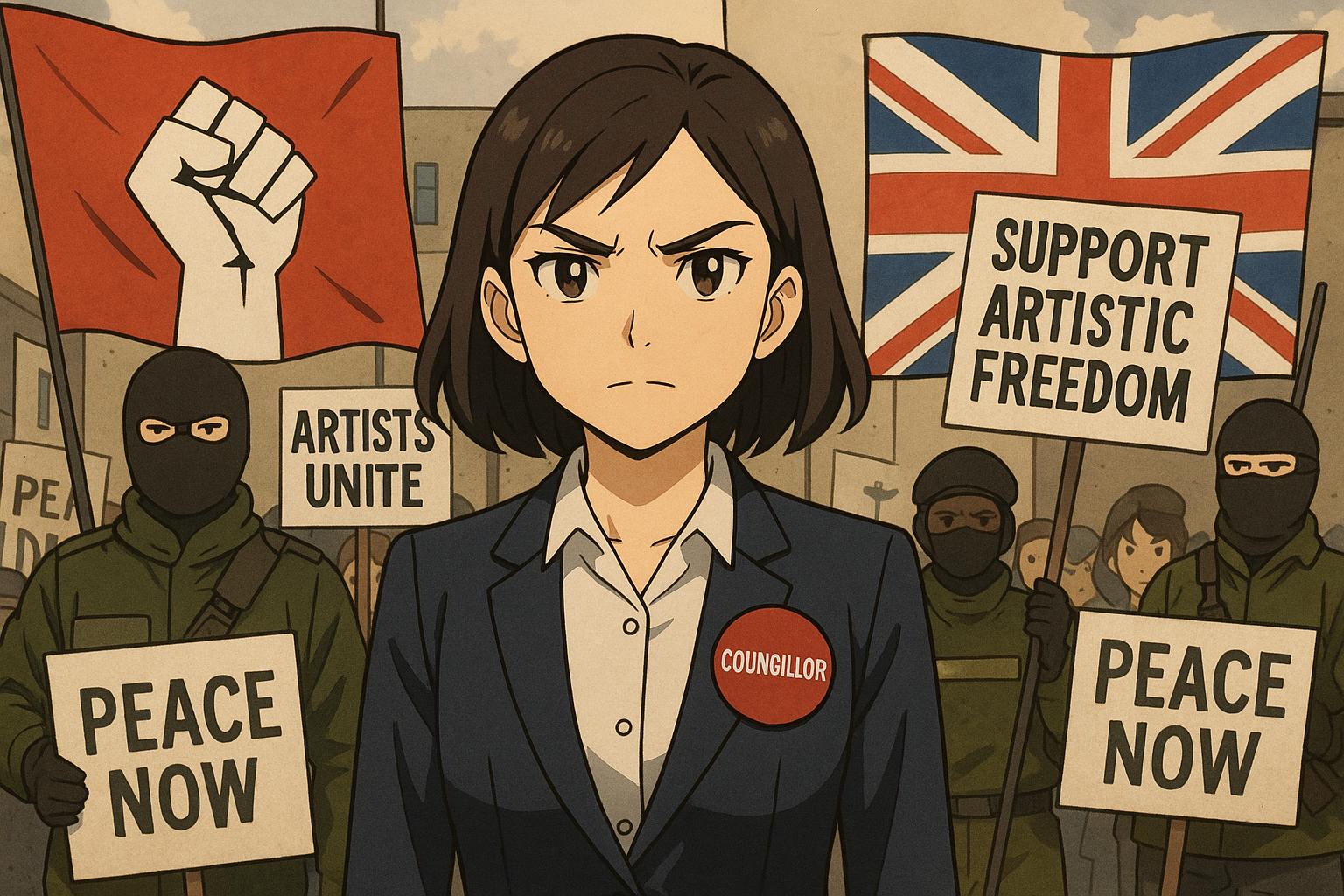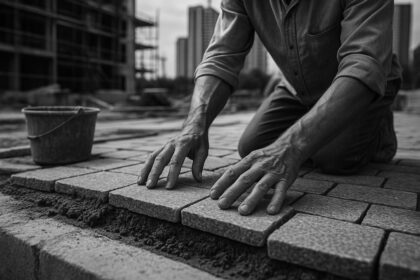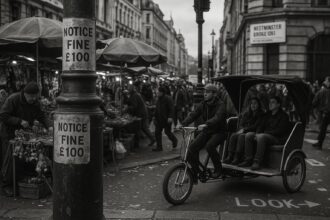An East Belfast councillor criticises the double standards as paramilitary flags remain visible during summer parades while Irish-language rap group Kneecap faces legal scrutiny. Calls grow for new legislation to end the tolerance of divisive emblems amid growing public frustration.
An east Belfast councillor has strongly condemned the hypocrisy displayed by figures criticizing the Irish-language rap group Kneecap while simultaneously endorsing the display of paramilitary flags in Northern Ireland. As the summer marching season nears, mounting calls from officials, including Belfast’s Lord Mayor Micky Murray, have emerged to end the annual practice of flying flags that celebrate groups deemed illegal under UK law—a practice that should have been unthinkable in a democratic society.
Councillor Brian Smyth, representing the Green Party, voiced the frustrations of many residents who see a blatant double standard in the political discourse. He stated, “For many, it’s clear there’s a hypocrisy when a member of Kneecap faces charges for supporting terrorism while paramilitary flags fly freely.” His remarks were triggered by the recent allegation against Kneecap member Liam Óg Ó hAnnaidh, who is accused of displaying a Hezbollah flag during a performance in London. The band asserts that their political expression is consistently distorted, declaring, “We condemn all attacks on civilians” and denying any allegiance to Hezbollah or Hamas.
The controversy surrounding Kneecap has reignited concerns regarding the proliferation of flags in certain locales, particularly those linked to loyalist paramilitary organizations like the Ulster Volunteer Force (UVF) and the Ulster Defence Association (UDA). Smyth lamented that in 2025, it remains entirely acceptable for these flags to dangle from lampposts, highlighting a broader failure of governance that has persisted for too long. “Both the Department for Infrastructure and the PSNI are dismissing this as a legislative issue,” he said, encapsulating a grim sense of stagnation felt in many local communities witnessing illegal acts unfold around them with no decisive action from authorities.
Lord Mayor Micky Murray, aligning himself with those concerned about the scrutiny of paramilitary flags, described them as a form of “littering” increasingly intolerable to residents. While cultural celebrations are valuable, he insisted there’s a critical distinction between honouring heritage and glorifying paramilitary groups. The Alliance Party, of which he is a member, is promoting new legislation aimed at regulating the display of flags and emblems—a welcome move to enforce a code of conduct for public spaces and curb inappropriate expressions of division.
In stark contrast to the ongoing debates about flag displays, Kneecap continues to navigate challenges stemming from their provocative performances. The group has faced backlash for their lyrics, with concert cancellations emerging in response to political pressure. The legal troubles surrounding Ó hAnnaidh have further amplified scrutiny on Kneecap, which argues they are being unfairly targeted due to their political outspokenness. As they gear up for performances at events like the Glastonbury Festival, they interpret these legal challenges as an attempt to suppress artistic expression.
Community leaders are increasingly vocal about the urgent need for effective action. Recent comments from SDLP councillor Donal Lyons have raised alarm regarding the anxiety flags linked to paramilitary groups create for local shoppers, stating, “These flags instill a chill factor.” Surveys reveal a widespread desire among the public—across both unionist and nationalist communities—to see such emblems eradicated from their neighbourhoods. However, the persistent absence of accountability regarding who should enforce the removal of these flags only deepens a sense of lawlessness, allowing them to proliferate without consequence.
As Northern Ireland grapples with the burden of its contentious past, the discussions surrounding Kneecap and the flags that represent discord serve as a stark reminder of the urgent need for a more robust governance framework. The current political climate offers an opportunity for aspiring leaders to take a stand against this hypocrisy and advocate for the interests of the communities they serve, ensuring that the progression toward genuine reconciliation does not continue to lag under the weight of nostalgic divisions.
Source: Noah Wire Services
- https://www.irishnews.com/news/northern-ireland/mayor-and-east-belfast-politician-slam-paramilitary-flags-littering-north-amid-kneecap-controversy-3H5EJ24C6JBAVLCCT3NMSN62RE/ – Please view link – unable to able to access data
- https://www.reuters.com/world/irish-band-kneecap-say-terrorism-charge-seeks-silence-artists-2025-05-22/ – Irish-language rap group Kneecap has condemned a terrorism-related charge against band member Liam O’Hanna as an attempt to silence politically outspoken artists. O’Hanna, 27, was charged by London’s Metropolitan Police for allegedly displaying a Hezbollah flag—representing the Iran-backed militant group banned in the UK—during a performance in November. Kneecap stated the flag was thrown on stage and denied endorsing Hezbollah or Hamas, emphasising their condemnation of all attacks on civilians. The band, known for advocating Irish identity and Irish unity, has been scrutinised recently for pro-Palestinian messaging during their Coachella performance. In April, they also apologised for previously controversial comments perceived as encouraging violence against MPs. O’Hanna is scheduled to appear in court on June 18. Despite mounting criticism, including calls from UK lawmakers for their exclusion, Kneecap is still set to perform at the Glastonbury Festival in June. ([reuters.com](https://www.reuters.com/world/irish-band-kneecap-say-terrorism-charge-seeks-silence-artists-2025-05-22/?utm_source=openai))
- https://apnews.com/article/951643fa3345a152f86b59bbdcbd0a49 – Liam Óg Ó hAnnaidh, also known by his stage name Mo Chara and a member of the Irish hip-hop group Kneecap, has been charged by British police under the Terrorism Act for allegedly displaying a Hezbollah flag during a performance at London’s Kentish Town Forum on November 21, 2024. The charge comes amid a broader investigation into the group by counterterrorism authorities, following videos purportedly showing the band endorsing Hezbollah and Hamas and inciting violence against lawmakers. Kneecap has denied these allegations, claiming their remarks were misrepresented by political figures. The group, based in Belfast, is recognised for promoting Irish-language culture but is controversial for its provocative lyrics and political stances. The controversy has led to several concert cancellations and calls from politicians to drop the band from events, including the upcoming Glastonbury Festival. Kneecap garnered wider attention following the release of their gritty self-titled feature film, which premiered at the 2024 Sundance Film Festival and was shortlisted for Academy Awards but did not advance to the final nominations. Ó hAnnaidh is scheduled to appear in court on June 18, and police continue to investigate footage from a separate 2023 concert. ([apnews.com](https://apnews.com/article/951643fa3345a152f86b59bbdcbd0a49?utm_source=openai))
- https://www.ft.com/content/b88745d2-d29b-4613-8632-fa763eb4f924 – Liam Óg Ó hAnnaidh, known by his stage name Mo Chara and a member of the Belfast-based Irish-language rap trio Kneecap, has been charged with a terrorism offence under the UK’s Terrorism Act 2000. The charge pertains to allegedly displaying a Hezbollah flag during a concert at London’s O2 Forum in November 2024, an act believed to suggest support for a proscribed organisation. Ó hAnnaidh is scheduled to appear at Westminster Magistrates’ Court on June 18. If convicted, he faces up to six months in prison and/or a fine. Kneecap has rejected the allegations, calling the charges a political distraction and an attempt to silence artists critical of global injustices, particularly in Gaza. They emphasised their condemnation of all attacks on civilians and denied support for Hamas or Hezbollah. The group’s performances, including a recent appearance at Coachella, have drawn attention for their political stance and symbolism rooted in Irish Republican sentiments. The charge follows an investigation by the Metropolitan Police’s Counter Terrorism Command using audience-filmed footage. ([ft.com](https://www.ft.com/content/b88745d2-d29b-4613-8632-fa763eb4f924?utm_source=openai))
- https://www.irishnews.com/news/northern-ireland/uda-flag-display-in-belfast-condemned-as-stormont-accused-of-failing-to-tackle-paramilitary-emblems-WSDSMTOAV5FGPPGOR4QVSUEXIY/ – The flying of new UDA flags in south Belfast has been slammed as a “failure of leadership” by the Executive in tackling the problem. Flags bearing the name and emblem of the proscribed organisation have appeared on lampposts in the Tates Avenue and Glenmachan Street areas. Their appearance comes weeks after it emerged the Department for Infrastructure (DfI) has received a 50% increase in requests to remove such emblems in the past year. Despite the rise in demands for action, not one unauthorised flag had been removed, it was revealed. ([irishnews.com](https://www.irishnews.com/news/northern-ireland/uda-flag-display-in-belfast-condemned-as-stormont-failure-to-tackle-paramilitary-emblems-WSDSMTOAV5FGPPGOR4QVSUEXIY/?utm_source=openai))
- https://www.irishnews.com/news/northernirelandnews/2023/05/28/news/loyalist_paramilitary_flags_outside_tesco_creating_a_chill_factor_for_shoppers-3308777/ – The appearance of loyalist paramilitary flags outside a major Tesco store in south Belfast is creating a “chill factor” for shoppers, a councillor has said. A blue UDA flag was among flags appearing on lampposts near the grounds of Tesco Newtownbreda in recent days. Elsewhere, UVF flags were also spotted along the lower part of the Ravenhill Road towards the Ormeau embankment. SDLP councillor Donal Lyons said political leadership was needed to tackle the familiar blight of unwanted flags. He said that little progress had also been made after Stormont set up a commission to report the issue of Flags, Identity, Culture and Tradition. Mr Lyons said confusion remained over who was responsible or for removing offensive flags. He said polling had continuously pointed out that most people of all traditions did not want flags in their area. They cause anxiety and creates a question about the rule of law. These people put the flags up without fear of interruption. It just seems to undermine that concept that we live in a society where everybody plays by the same rules. ([irishnews.com](https://www.irishnews.com/news/northernirelandnews/2023/05/28/news/loyalist_paramilitary_flags_outside_tesco_creating_a_chill_factor_for_shoppers-3308777/?utm_source=openai))













